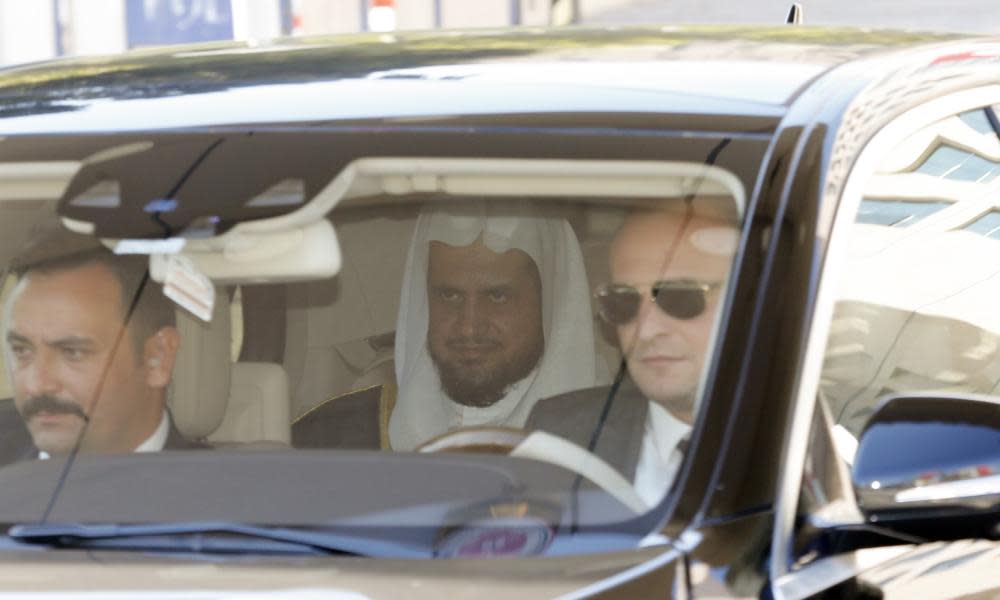Turkey refuses to share all Khashoggi evidence with Saudis

Turkish investigators have refused to share with Saudi Arabia’s public prosecutor all the evidence they have compiled on Saudi complicity in the murder of Washington Post journalist Jamal Khashoggi.
The Saudi prosecutor Saud al-Mojeb held talks with the Istanbul chief prosecutor on Monday morning in Istanbul, but the lack of trust between the two countries led to a relatively brief meeting of only 75 minutes.
Turkey had wanted confirmation on the whereabouts of Khashoggi’s remains, the identity of the local cooperator that the Saudis claim disposed of the body, and an update on the progress of a Saudi investigation of the 15 Saudi operatives who visited the Istanbul consulate at the time of the murder on 2 October.
Turkey’s state broadcaster TRT Haber said Saudi officials asked for the whole investigation folder, including evidence, statements and footage, to be given to them. TRT said the Saudi request was denied.
Saudi Arabia has admitted that a premeditated plan was made to kill Khashoggi, but say it was set up by a group of rogue operators without the knowledge of the Saudi crown prince, Mohammed bin Salman.
The Turkish president, Recep Tayyip Erdoğan, had earlier welcomed the prosecutor’s arrival, while the foreign minister Mevlüt Çavuşoğlu had called on Riyadh to start co-operating so the whole world could know the truth about Khashoggi’s killing.
At a memorial service for Khashoggi in London, his fiancee, Hatice Cengiz, said there must be no cover-up, and called for western countries to demand justice. Cengiz said she had been disappointed by some countries’ response to his death, singling out Donald Trump for “paving the way for a cover-up”.
Khashoggi’s fiancee said she said believed that the Saudi government knew the whereabouts of his body, and that her life was turned upside down “on the horrible day that Jamal entered the Saudi consulate”.
“If only I had known there was such an evil bloodthirsty crew I would have done everything to stop him entering that building,” she said. “We never imagined such a level of barbarity and evil.”
Cengiz described Khashoggi as a “patriot who felt it his duty to become the voice of the voiceless”. She added: “He wrote what he believed and only wrote what he knew was right, and not what would satisfy the powerful.”
Western powers believe Erdoğan is still holding back evidence in a bid to back Prince Mohammed into a corner. Turkey has yet to release an audio tape which was allegedly a recording of the killing of Khashoggi, or evidence to show that the 15 Saudi operatives inside the Saudi consulate in Istanbul made four phone calls to the crown prince’s office, as pro-government Turkish media have claimed, based on leaked information.
Khashoggi’s remains have not been found but cars from the Saudi consulate went to the consul general’s residence, with one vehicle continuing to woodland on the edge of Istanbul.
Pro-government Turkish media have published new photos of cars owned by the Saudi diplomatic mission being cleaned before police were allowed to search them.
Jamal Khashoggi is one of the Arab world’s most prominent journalists and commentators. He is an outspoken critic of Saudi Arabia who has dared to defy Crown Prince Mohammed bin Salman, the kingdom’s de facto ruler.
While living in Saudi Arabia, Khashoggi was told to stop writing or posting on Twitter, where he has more than 1.6 million followers. He moved to the US more than a year ago, where he continued to comment on his country both in print and on television. He wrote columns for the Washington Post and the Guardian.
His message struck a nuanced tone in the US, where he tried to acknowledge the reforms undertaken by Bin Salman while also highlighting the flaws.
Khashoggi previously had close links with the Saudi royal family, including having served as a media aide to Prince Turki al-Faisal, when the latter was director general of the Saudi intelligence agency.
He is also a former editor of the Saudi newspaper al-Watan and had worked with Prince Alwaleed bin Talal, a grandson of the first Saudi king who was detained last year as part of what the authorities said was an anti-corruption campaign.
A driver who drove some of the Saudi team to the airport after Khashoggi’s murder told A Haber television that the men had appeared relaxed and cheerful, smoking and drinking alcohol on the way home.
Khashoggi’s death has caused a major diplomatic crisis for Saudi Arabia and has cast an unwelcome spotlight on bin Salman, whom many believe must have been aware of an operation that allegedly involved several members of his personal guard and trusted senior officials.
Turkish prosecutors have prepared an extradition request for 18 suspects arrested by Riyadh as part of the Saudi investigation, including the 15 who were at the consulate, although the Saudi foreign minister insisted on Saturday that the men would be tried on Saudi soil.
Although Saudi Arabia has vowed it will conduct a thorough criminal investigation and deliver justice for Khashoggi, Turkish investigators have been faced with several delays from their Saudi counterparts. Riyadh and Ankara’s versions of what happened to the dissident writer are wildly different.
Turkey maintains there is evidence that shows Khashoggi was tortured and murdered during an appointment at the Saudi consulate by a hit team of 15 men sent from Riyadh.
The Saudi authorities initially denied they had anything to do with Khashoggi’s disappearance before eventually alleging that he had died in a fistfight with officials who had embarked on an unauthorised extradition operation.
Turkish investigators are still seeking permission to drain a well in the grounds of the Saudi consul general’s residence, where it is believed the journalist’s remains could have been disposed.

 Yahoo News
Yahoo News 
